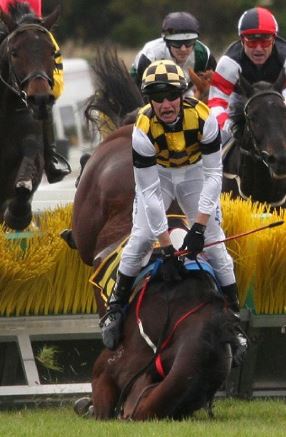Fatigue, falls and collisions are negative experiences which may cause mental distress in jumps racing horses as well as physical injuries which are also likely to cause pain. The RSPCA is opposed to jumps races (steeplechasing and hurdling) because of the high probability of a horse suffering serious injury or even death as a result of participating in these events.
What are jumps races?
Jumps races are generally over 3km, this is at least 1km longer than flat races. In addition to clearing obstacles, horses are required to carry heavier weights – a minimum of 64kg compared to minimum of 54kg for flat racing.
Only Victoria continues to hold jumps races in Australia.

What are the impacts of fatigue?
Fatigue results in physiological changes as well as mental distress from the time it begins to when exertion ceases. Exercise and fatigue have been well researched in humans where it has been shown that contracting muscle fibres release chemicals called cytokines which affect many organs including the brain. The release of cytokines results in sensations of fatigue and exhaustion, leading to a behavioural response to cease the activity. Horses who are behind the field and subsequently eased out of the race due to fatigue and exhaustion are likely to be experiencing both reduced physical capacity and mental distress. Compelling and whipping horses to participate in such events where fatigue is likely to occur indicates a significant compromise to welfare, both physically and mentally.
Does fatigue increase the risk of horses falling?
Fatigue has been recognised as a significant factor resulting in a higher incidence of falls, injury and death, particularly in the latter part of a race [1]. The Jones Review (2008), which was commissioned by Racing Victoria, cited a scientific report conducted by Dr Tim Parkin in 2005 which found the majority of jumps falls in Victoria occurred in the second half of the races and that 95% of falls included some degree of contact with the fence . The Jones Review stated that horses are more likely to make a mistake in jumping an obstacle when they are fatigued.
“Ours” falling in final stages of steeplechase, Oakbank SA, 22 April 2019. Video used with permission.
Do many horses experience fatigue during a jumps race?
Since 2009, jockeys have been required to retire horses from races due to fatigue. An unpublished review undertaken by RSPCA South Australia of South Australian steward reports for the 2015 season showed that of 128 starters, 13 horses failed to finish, which equates to 10.1% [2]. This proportion indicates that many horses are experiencing significant exhaustion during a jumps race. This figure is consistent with the findings of a study which reported that about 10% of horses who competed in Victoria and South Australia during 2012-2014 inclusive were recorded as failed to finish [3]. In addition, this study also found that 3.3% of jumps horses fell during the same time period.
References
[1] Judge David Jones (2008) Review of Jumps Racing in Victoria, Commissioned by Racing Victoria Limited.
[2] RSPCA South Australia (2016) Submission to the Committee on Jumps Racing in South Australia pp10 (accessed 14th July 2017).
[3] Ruse K, Davison A and Bridle K (2015) Jump horse safety: Reconciling public debate and Australian Thoroughbred jump racing data, 2012-2014. Animals 5:1072-1091.
